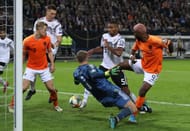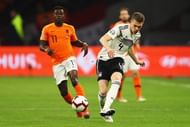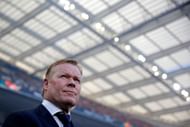
After a disappointing UEFA Nations League campaign, Germany restarted their Euro 2020 qualification campaign against Ronald Koeman's Dutch side. Joachim Low, on the back of observing a string of defensive frailties, has adopted a compact system of three central defenders in recent games.
Manuel Neuer started the game between the sticks for Germany with Matthias Ginter, Niklas Sule, and Jonathan Tah forming the last line of defence. Lukas Klostermann and Nico Schulz were the wing-backs. Joshua Kimmich and Toni Kroos formed a two-man midfield axis.
To lead the German attack, Low deployed Serge Gnabry and Timo Werner as the two strikers, with Marco Reus operating behind them as a No.10.
The Netherlands, still fresh from Nations League final's disappointment against Portugal, was set up in a 4-3-3 system which transformed into 3-1-4-2 in possession.
Former Barcelona shot-stopper Jasper Cilissen, alongside Denzel Dumfries, Matthijs De Ligt, Virgil van Dijk, and Daley Blind formed the defence.
Giorgio Wijnaldum, Frenkie De Jong, and Marten de Roon formed the midfield engine. The front three consisted of Quincy Promes, Memphis Depay, and Ryan Babel.
Playing with a set of new tactics, Die Mannschaft found it difficult to control the game for the opening few minutes. However, Gnabry's opener settled the Germans. Despite dominating possession, Oranje found it difficult to manufacture clear-cut chances against a compact opposition.
However, Koeman's side crawled their way into the game in the second-half, where a six-minute blitzkrieg put them ahead. With the Netherlands gaining the impetus and looking to gain a two-goal cushion, a controversial penalty call on De Ligt's handball allowed the hosts to make it 2-2 through Toni Kroos.
But, the Dutch side kept pushing and sealed the game through Donyell Malen and Georginio Wijnaldum and returned home with all three points.
Without further ado, let's have a look at how Joachim Low's German side lost all three points in Hamburg.
#3 Germany's lethargic defending cost them dear against an industrious Dutch attack

Despite lining up with three at the back, Germany's foundation looked shaky whenever Netherlands' attackers pressed them. The centre-backs were unable to sustain possession due to a lack of cohesion between the midfield and defensive lines. Jonathan Tah, on various occasions during the first half, gifted the ball to the opposition, courtesy of his wayward passes.
Owing to the lack of intensity in the opening 45 minutes of Netherlands' game, Germany weren't punished for their defensive mistakes. Memphis Depay, with his strength and purpose, however kept asking questions throughout the course of the first half.
With a refreshed Oranje side gracing the second period, Die Mannschaft's midfield axis and central defenders found it difficult to circulate the ball crisply and with a quick tempo. Depay, alongside Ryan Babel and Georginio Wijnaldum, orchestrated a well-deserved comeback in Hamburg.
Wijnaldum and Babel strung a series of telling passes on the left-flank and exposed Ginter defensively. The Liverpool midfielder forced a terrific save off Manuel Neuer early in the second half. Eventually, Frenkie De Jong equalised for the Netherlands, finishing smartly after receiving the ball in an open space behind Jonathan Tah.
To make matters worse, Tah failed to clear the ball from a corner-kick which was initially won by Virgil van Dijk, aiding the visitors to gain the lead with his own-goal.
After that moment, Malen and Wijnaldum translated Netherlands' dominance into goals.
#2 Die Mannschaft's inexperience cost them the points

After a shaky start, the German side was in control in the majority of the first 45 minutes off the game. In spite of Memphis Depay putting pressure on the oppostion midfield and defensive line, Toni Kroos and Joshua Kimmich, with their guile and experience were able to induce cheeky fouls.
The only factor which pushed Germany back was to capitalise when they dominated. Despite executing their counter-attacking plans with Serge Gnabry and Timo Werner providing the outlets, Die Mannschaft failed to score an all-important second goal to dominate the game.
Gnabry caused a few headaches to Blind, De Ligt, and Dumfries but, failed to add to his first goal. Marco Reus had a glorious opportunity to extend his side's advantage although, a smart save from Cillisen denied the Borussia Dortmund captain.
Regardless of being exposed on multiple occasions, Oranje ended the first-half trailing 1-0. And, Germany's naivety in adjusting to Netherland's intensity compelled them into mistakes an experienced side wouldn't have made.
Be it Nico Schulz's misplaced pass for Netherlands's first goal or Tah's set-piece blunder, this budding Germany side is poised to make many more such mistakes in the near future, which going forward, will be a major learning curve for them.
#1 Ronald Koeman's tactical flexibility snatched three points from the Germans

Clearly, it was a game of two halves for the travelling Netherlands side. During the opening 45 minutes, the Dutch failed to create well-defined chances despite dominating the ball. Die Mannschaft, playing it compact, exposed Koeman's men on the counter-attack. However, the Nations League finalist managed to stay in the game after an average opening phase of play.
Right from the start of the second period, a different Dutch side was on display which showed a lot of industry and tactical nous in the execution. The Oranje chose to direct their press towards the left-flank where a pace-deprived Mathias Ginter was deployed.
In a rampant six-minute period, Babel and Wijnaldum combined multiple times to help their side score two goals. This was not a fluke, as Wijnaldum was brought in more centrally to intensify the pressing and aid Depay, Malen, and Babel in the process.
Seeking goals to reassert their winning status, Germany pushed forward to create chances. However, a solid defensive shift from Van Dijk allowed Depay to manufacture key passes for this national side's final two goals.
All of this was down to Koeman orienting the press towards Germany's right-side and allowing more positional freedom to Wijnaldum and De Jong. Substituting De Roon and Quincy Promes for Malen and Davy Propper proved to be a masterstroke from the former Southampton tactician.
To kill the game in the last 10 minutes, Nathan Ake was subbed on for Ryan Babel to form a defensive block to nullify German's final push. This move capped off a terrific night for Ronald Koeman tactics-wise. Maybe, Joachim Low should've tried a few things different himself.
